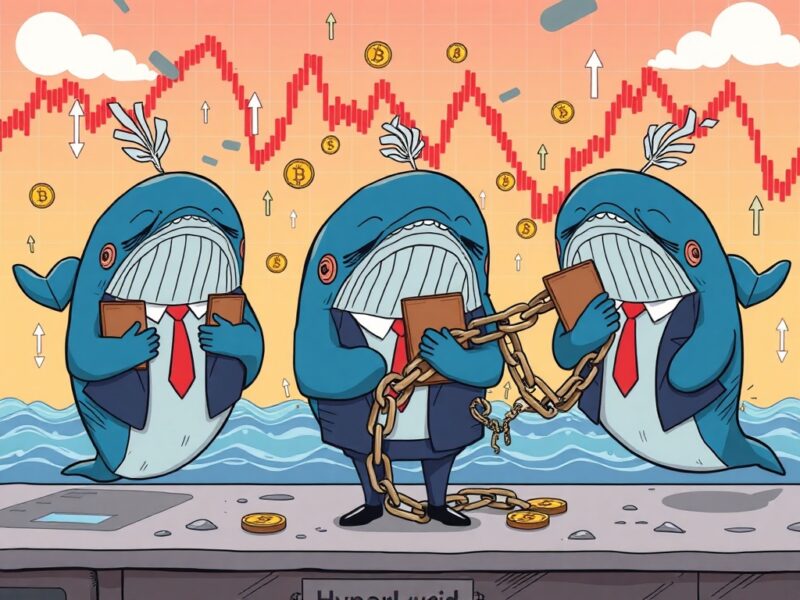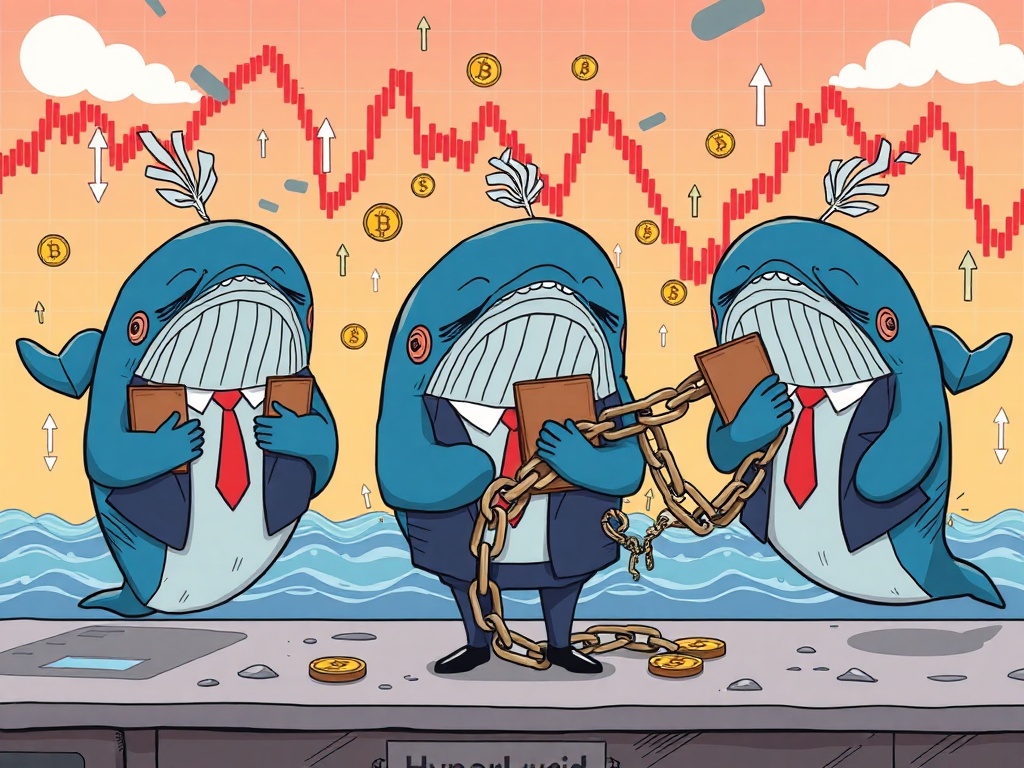Shocking Hyperliquid Whale Losses: Three Major Traders Face Devastating Crypto Trading Losses
0
0

BitcoinWorld

Shocking Hyperliquid Whale Losses: Three Major Traders Face Devastating Crypto Trading Losses
The volatile world of cryptocurrency trading can bring immense gains, but it also carries significant risks, especially for those who trade with large capital. Recently, the crypto community witnessed a stark reminder of these dangers as three prominent Hyperliquid whales suffered devastating crypto trading losses. These powerful traders, known for their substantial market influence, saw their fortunes vanish, offering crucial on-chain insights into the perils of high-stakes speculation.
Who Are These Hyperliquid Whales, And What Went Wrong?
On-chain analyst @EmberCN recently brought to light the unfortunate fates of three major traders on the Hyperliquid platform. These individuals, often referred to as ‘whales’ due to their massive holdings and trading volumes, exemplify the high-risk, high-reward nature of the crypto market.
- James Wynn: Once boasting an impressive $87 million in profits by late May, Wynn’s journey took a dramatic turn. He not only lost all his accumulated profits but also his entire principal of $21.77 million. A key factor was his colossal Bitcoin (BTC) long position, valued at up to $1.23 billion, opened at the end of May. This massive bet ultimately led to his downfall.
- @qwatio: Another insider whale, @qwatio, had previously turned a modest $3 million principal into a remarkable $26 million profit. Despite this success, the tides turned, and @qwatio ultimately lost their entire initial principal.
- AguilaTrades: This trader faced continuous liquidations over recent days, leaving them with a mere $30,000. Their experience highlights the relentless nature of market movements against highly leveraged positions.
The Peril of Leverage Trading and Its Consequences
The stories of these Hyperliquid whales underscore the extreme dangers associated with leverage trading. Leverage allows traders to open positions much larger than their actual capital, amplifying both potential profits and, critically, potential losses. While it can accelerate gains, it also means a small adverse price movement can wipe out an entire account.
When a trader’s losses on a leveraged position exceed their collateral, the exchange automatically closes their position to prevent further losses. This process is known as liquidation. For these whales, their massive leveraged positions meant that even minor market fluctuations could trigger catastrophic outcomes, leading to significant crypto trading losses.
What Does Whale Liquidation Mean for Traders?
The whale liquidation events on Hyperliquid provide valuable lessons for all market participants. When large positions are liquidated, it can create cascading effects, adding selling pressure to the market. This can lead to further price declines, impacting other traders.
Understanding these dynamics is crucial for anyone involved in crypto. These incidents are not isolated; they are a constant reminder that even the most experienced and well-capitalized traders are vulnerable to market volatility, especially when engaging in high-risk strategies like aggressive leverage trading. It’s a stark illustration of how quickly fortunes can reverse.
Lessons from These Devastating Crypto Trading Losses
The unfortunate experiences of James Wynn, @qwatio, and AguilaTrades offer critical takeaways for every crypto investor and trader:
- Risk Management is Paramount: Never risk more than you can afford to lose. Implement stop-loss orders and manage your position sizes carefully.
- Understand Leverage: While enticing, leverage is a double-edged sword. Use it cautiously and only if you fully comprehend its mechanics and associated risks.
- Diversify Your Portfolio: Putting all your capital into one highly leveraged trade, as seen with James Wynn’s BTC long, concentrates risk.
- Stay Informed with On-Chain Insights: Following reputable analysts like @EmberCN can provide valuable context, but always conduct your own research and exercise caution.
These incidents serve as a powerful cautionary tale. Even those with substantial capital and prior success are not immune to the market’s unpredictable nature. Prudent risk management and a clear understanding of the tools you use are essential for navigating the often-turbulent waters of cryptocurrency trading.
Frequently Asked Questions (FAQs)
What is a crypto whale?
A crypto whale is an individual or entity that holds a very large amount of cryptocurrency, enough to potentially influence market prices with their trades. Their actions are often tracked for market insights.
What is Hyperliquid?
Hyperliquid is a decentralized perpetual exchange that allows users to trade cryptocurrencies with leverage, offering high liquidity and low fees.
How does leverage trading work?
Leverage trading involves borrowing funds to increase your trading position beyond what your actual capital allows. For example, with 10x leverage, a $1,000 deposit lets you control a $10,000 position. This amplifies both potential profits and losses.
What is liquidation in crypto trading?
Liquidation occurs when a trader’s margin (collateral) falls below a certain level due to losses on their leveraged position. The exchange automatically closes the position to prevent further losses, often resulting in the loss of the initial capital.
Can small traders be affected by whale liquidation?
Yes, large-scale whale liquidations can create significant selling pressure, leading to rapid price drops that can affect all traders, regardless of their position size.
Did you find this article insightful? Share it with your friends and fellow traders on social media to help them understand the critical risks involved in high-stakes crypto trading!
To learn more about the latest crypto market trends, explore our article on key developments shaping Bitcoin price action.
This post Shocking Hyperliquid Whale Losses: Three Major Traders Face Devastating Crypto Trading Losses first appeared on BitcoinWorld and is written by Editorial Team
0
0
 Manage all your crypto, NFT and DeFi from one place
Manage all your crypto, NFT and DeFi from one placeSecurely connect the portfolio you’re using to start.





